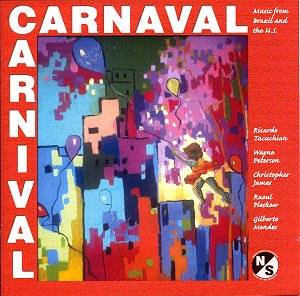The present release is another telling example of NORTH/SOUTH’s
exploration of contemporary American music, both from North and South
America, since two composers here are from Brazil. One of them, Gilberto
Mendes, is better-known, at least as far as the present writer is concerned,
for some of his music is available on a Belgian CD (VOX TEMPORIS CD
92030) devoted to some of Mendes’ recent works including the piece by
which he is represented here.
Brazilian-born Ricardo Tacuchian scored his colourful
Toccata Urbana for woodwind quartet, string quintet and
piano. The title aptly hints at the actual musical content of the piece.
This is a brilliant display of virtuoso writing characterised by an
energetic rhythmic drive. A very attractive and enjoyable piece of music
in its own right.
Wayne Peterson’s Janus for small mixed
ensemble is harmonically more astringent and its energy is often expressed
in more angular, nervous phrases. As is well known, Janus’s head had
two faces, so Peterson’s work also looks backward on his earlier music
and forward to some new procedures. Similarly too, the music alternates
two main ideas, one fast and somewhat fragmentary, the other broad and
lyrical, which are constantly manipulated and varied.
Christopher James’s In frostiger Nacht
incorporates material from an earlier setting of Hölderlin’s elegy
Diotima composed in 1992. It is a miniature concerto for piano
and small mixed ensemble cast in a single-movement structure falling
into four contrasting sections. The first section acts as an introduction
whereas the second and third movements are more clearly related to Hölderlin’s
poem. Resolution is achieved in the final section. On the whole, James’s
music is more traditional, overtly alluding to Romantic models of the
late 19th Century and including some phrases that sound as
direct quotations; but I must admit that I have not been able to identify
them. A substantial work, all the same, and well worth having.
Pleskow’s music has already featured in other NORTH/SOUTH
releases. This Austrian-born composer was educated in New York and studied
with Karl Rathaus and Stefan Wolpe, among others. Chamber Setting
with Voice for soprano, violin, cello, flute/piccolo and piano
sets four short texts of quite different origin: excerpts from an Ode
by Horace, excerpts from Lament by Shelley, an anonymous Incipit
from the 13th century in Provençal and four lines
from Shakespeare’s Richard III that all "share such autumnal
concerns, as night, deploration and melancholy". These brief texts
are set in a freely atonal manner well suited to the chosen poems.
A number of Mendes’s works have quite eccentric titles
which say very little, if at all, of the musical content. Ulysses
in Copacabana Surfing with James Joyce and Dorothy Lamour is
one of them. The music uses materials derived from classical and popular
sources much in the same way as Joyce’s "stream of consciousness".
So, whiffs from Stravinsky’s Rite of Spring, Debussy’s
Danseuses de Delphes and Schubert’s Unfinished Symphony
as well as popular tunes and rhythms surface here and there throughout
the piece which ends with a clear Brazilian touch, on a Bossa nova
rhythm. A colourful, fanciful kaleidoscope, and a quite entertaining
piece of music. (Oh, yes, I was in love with Dorothy Lamour when I was
a teenager!)
As is often the case with similar collections, the
variety of styles as well as the varying horizons from which the composers
come may be considered as uneven. Nevertheless, all pieces here actually
deserve to be heard for each has its qualities and character. The whole
is a quite enjoyable collection of accessible works. Excellent performances
and very fine recording.
Hubert Culot
